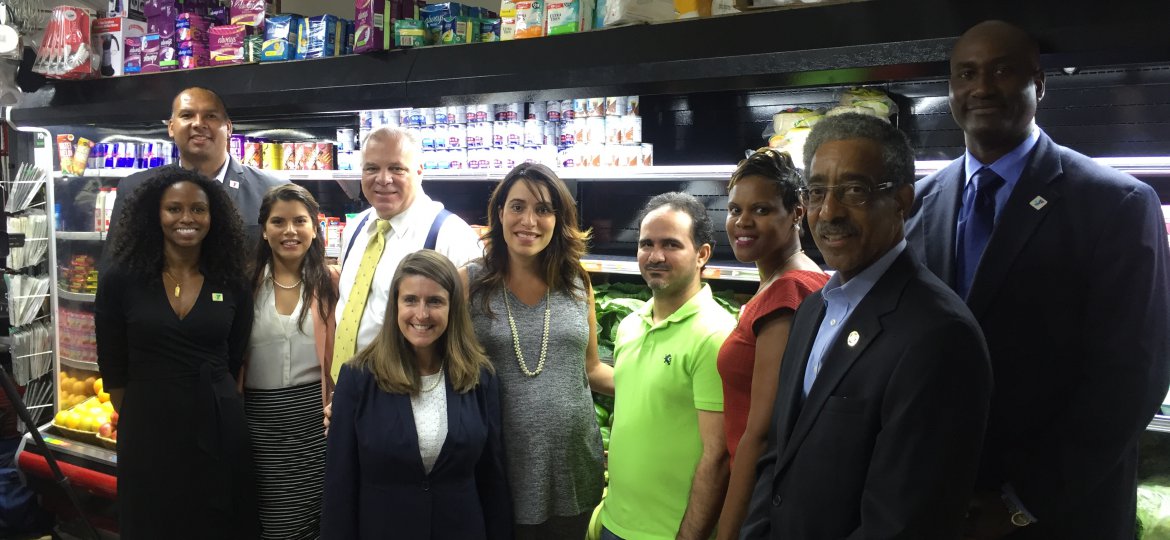
TRENTON – Senate President Steve Sweeney, Senator Ronald L. Rice, Senator M. Teresa Ruiz, and Assemblywoman Shavonda Sumter today were joined by advocates at a press conference in Newark to discuss the importance of increasing the availability of healthy food options for residents in urban and rural areas of New Jersey.
“Too many New Jerseyans live in ‘food deserts’ or other areas where they do not have access to fresh and healthy foods,” said Senate President Sweeney. “The Legislature overwhelmingly supported a bill that is designed to improve availability of nutritional foods by providing funding and assistance to smaller food retailers. Despite the governor’s conditional veto of the legislation, we are not going to walk away from this effort. We are going to continue to work toward ensuring that residents across New Jersey have access to healthy food options.”
The governor on Wednesday conditionally vetoed legislation (S1129), sponsored by Senators Rice and Ruiz, that would create the “Healthy Corner Store Program” within the state Department of Health, under which small food retailers in low to moderate income neighborhoods could have applied for funding to increase the availability and sale of fresh and nutritious food at affordable prices. The legislation would have expanded upon the NJ Healthy Corner Store Initiative operated by The American Heart Association, The Food Trust and others, by providing state resources that would have allowed additional stores in New Jersey to offer fresh foods.
“In both urban and rural areas, the availability of fresh foods in local stores is limited. Unfortunately, finding potato chips and candy bars is often far easier than locating fresh produce. An unhealthy diet can have an impact on the health of families in the community but also on the healthy development of children,” said Senator Rice (D-Essex). “We are disappointed with the conditional veto but are committed to continuing the effort to make nutritious foods available to more families in New Jersey.”
Lack of access to healthy, affordable food is a major problem for many New Jersey residents. According to advocates, the USDA in 2011 identified 134 food deserts in New Jersey where 340,000 residents lived in urban, rural and suburban communities across the state that lacked sufficient access to affordable, healthy food. The Reinvestment Fund, in 2010, issued a report suggesting more alarming numbers, with as many as 924,000 residents—10% of New Jersey’s population— lacking access to affordable, healthy food, even if they do not live in a federally recognized “food desert.”
The legislators were joined at the press conference by Corrine Orlando, the American Heart Association director of government relations; Michael Bright, Newark YMCA President and CEO; Darrin Anderson, PhD, associate executive director of the NJ YMCA State Alliance; Tanya Martinez, of The Food Trust; and Mr. Santiago Rodriguez, owner of Lucky Fox Supermarket in Newark.
“A healthy diet helps provide children with energy and improves brain function. Alternatively, we know that an unhealthy diet can have a negative effect on a child’s health as well as their ability to pay attention and learn,” said Senator Ruiz. “Providing assistance to small food retailers to stock fresh produce and other healthy foods is vital because it will expand access to nutritional options in our communities. This issue is important to families and to our state, and we look forward to continuing our work.”
The bill would have established a “Healthy Small Food Retailer Fund” within the Department of Health to support the program. The legislation authorized DOH to select one or more grantees to administer the program and distribute funding to small food retailers. Money from the fund could have been used for: (1) salary and associated administrative costs towards providing education, advice, or other assistance to small food retailers; (2) refrigeration, display shelving, or other equipment necessary for a retailer to keep stock of healthy foods and fresh produce, up to $5,000 per retailer; (3) materials and supplies for nutrition education and healthy food promotion; and (4) mini-grants of up to $100 per retailer to meet initial expenses incurred with participation in the program.
“Providing healthy foods locally is critically important, particularly in areas where residents rely on public transportation,” said Assemblywoman Sumter. “The fact is that if fresh fruit and vegetables are not available, many families will be forced to resort to less healthy alternatives. That is unacceptable. We live in the Garden State and healthy and affordable foods should not be out of reach for our residents, regardless of where they live. I remain steadfast in my commitment to improving food access.”

